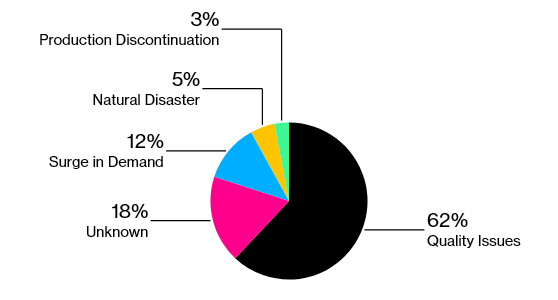Lasers vs tinnitus, DoD distrusts FDA, annual sunburn story, and more
24 Jun 2023
Posted by Andrew Kantor
DoD isn’t happy about med safety
The US military is going all trust but verify on the FDA. The Department of Defense is apparently concerned enough about the quality of generic drugs — many of which come from facilities (foreign and domestic) that have had … issues — that it’s talking to independent lab Valisure to test generic drugs for contamination.
The move raises questions about the Food and Drug Administration’s ability to adequately police generic medicines. With mounting drug shortages, most of which are caused by quality problems, military officials have gone so far as to call vulnerabilities in the drug supply chain a national security threat.
Fun fact: Kaiser Permanente already does this. “Kaiser, which serves 12.7 million Americans, started working with Valisure on additional drug quality checks more than two years ago.”
And with the possibility of regulations being loosened in order to ease drug shortages, you can bet that quality is going to get a bunch more scrutiny.
FDA: Illegal vapes are illegal
If for some reason you’re selling Elf Bar or Esco Bar disposable e-cigs, stop. They’re illegal, and the FDA is cracking down — it “issued warnings to 189 convenience stores, vape shops and other retailers” so far, and customs officials are seizing the stuff at ports.
Fun fact: When vapes are outlawed, only outlaws will sell vapes.
Under the law, companies were supposed to remove their vapes from the market and file FDA applications, but new products continue to launch.
Lasers beat pharma for tinnitus
There aren’t any treatments for tinnitus, but that doesn’t mean people haven’t come up with some interesting ones. Do any stand out? Yes, as a matter of fact, said Brazilian scientists. Shooting lasers at it.
Of course, no one calls it “shooting lasers in your ears” — it’s low-level laser therapy and associated photobiomodulation. And, per the study, it’s the best of a so-so lot of options.
The contenders:
The treatments tested were laser acupuncture, flunarizine dihydrochloride, Ginkgo biloba (a medicinal plant), and low-level laser stimulation of the internal auditory canal or meatus (transmeatal stimulation), on its own and combined with vacuum therapy, ultrasound, G. biloba or flunarizine dihydrochloride.
“The best outcomes,” they found, “were observed in patients treated with laser acupuncture alone and transmeatal low-power laser stimulation alone.”
Now you know.
Sunburn and meds
This is a story that runs every year, so we’ll keep it short. Remember that a bunch of medications you dispense might make your patients more susceptible to sunburn.
The folks at Healthline have the list of common and less-common meds that might suggest a bottle of SPF 30 with every purchase.
The latest Covid-origins overview
As much fun as I like to poke at the Atlantic, it does do good journalism … although it dies like to channel its inner Eeyore. If you’re interested in a balanced look at the Covid-origins debate, the magazine’s got you covered with the evidence, the questions, and the contradictions for both a lab-leak theory and a public-market theory, taking into account the latest revelations.
[T]he origins question has broken down into a pair of rival theories that don’t—and can’t—ever fully interact. They’re based on different sorts of evidence, with different standards for evaluation and debate. Each story may be accruing new details—fresh intelligence about the goings-on at WIV, for example, or fresh genomic data from the market—but these are only filling out a picture that will never be complete.
Short Takes
A new flu-blocking med
In between flu vaccines and flu treatment are flu preventatives — drugs given to people at high risk from the flu but who can’t be vaccinated. And the FDA has just fast-tracked one (CD388) from Cidara and Janssen. Scientifically speaking it’s technically a drug-Fc conjugate and officially for “the prevention of influenza A and B infection in adults who are at high risk of severe influenza, including those for whom vaccines are either ineffective or contraindicated.”
Just gonna put this out there
President Biden signed an executive order designed to increase women’s access to contraception. The goal is to keep the issue of abortion from even arising in the first place by reducing unwanted and unplanned pregnancies. Plans going forward “could include convening pharmacies, employers, and insurers to discuss the issue.”




